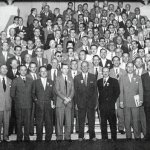In the 60 years that followed, we have gone from patients to tissues to cells and now to genetic precursors. This basic research, done by very talented investigators, depends heavily on the existence of modern machinery of detection.
The earliest scientific rheumatologists used little but their wits, but they knew what even the most basic researcher today should keep in mind: The care of the patient is what it’s all about.
Dr. Engleman and I knew all the rheumatic disease specialists mentioned earlier, and they had one thing in common: They were all extremely nice, considerate and caring people. The genetics of rheumatology are strong, and the field continues, perhaps on a self-selected basis, to attract that kind of person.
My wife, Lucille, who also knew the earlier, as well as the current, rheumatologists, claims that we are the nicest physicians in the world. Needless to say, I agree with her.
 Among his many distinctions, Charles M. Plotz, MD, MedScD, MACR, is an ACR Gold Medal recipient and holds ACR Master distinction.
Among his many distinctions, Charles M. Plotz, MD, MedScD, MACR, is an ACR Gold Medal recipient and holds ACR Master distinction.
Listen to Dr. Plotz talk about the history of rheumatology in an interview recorded for the ACR’s 75th anniversary.

